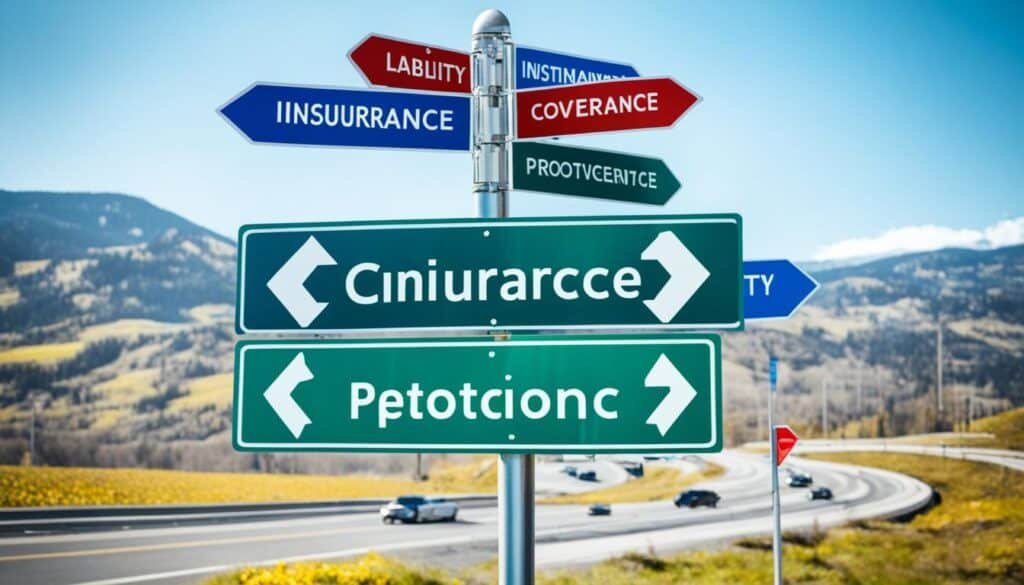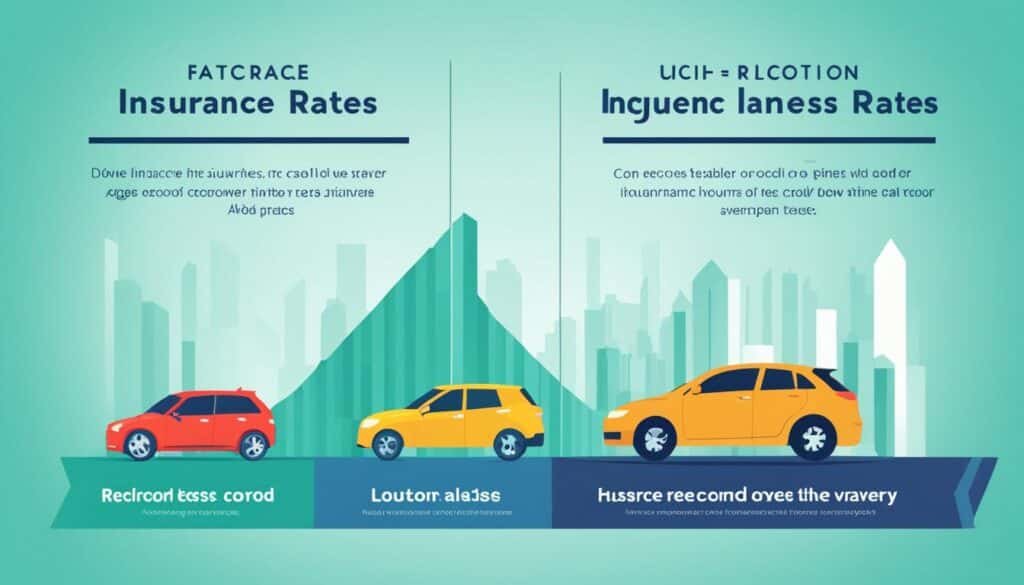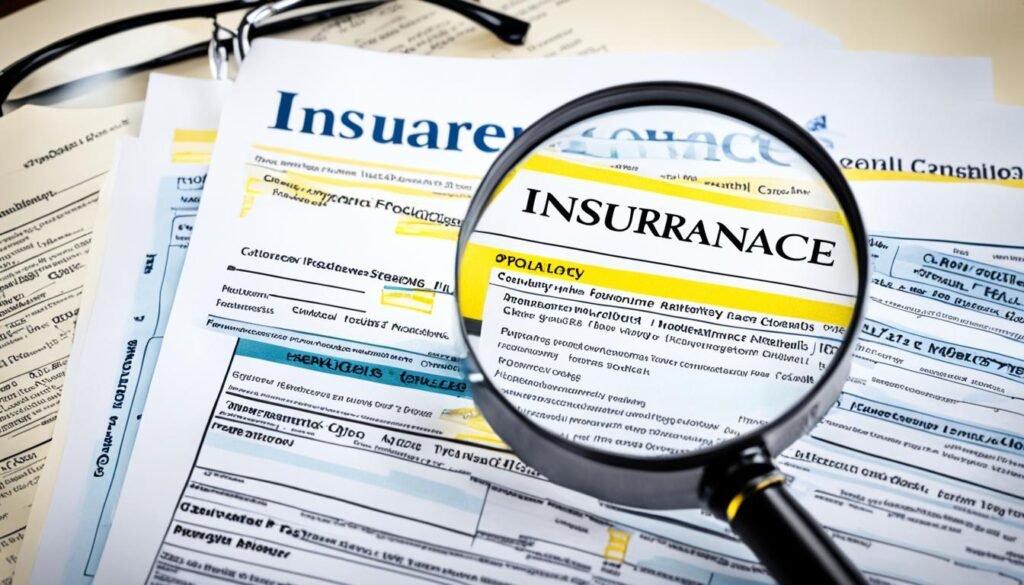General insurance plays a crucial role in providing financial protection for cars, homes, and health. Understanding the different types of coverage options, insurance companies, and policy terms is essential for making informed decisions. In this comprehensive guide, we will explore the key aspects of general insurance, including the different coverage options, insurance companies, and policies available.
Key Takeaways:
- General insurance offers financial protection for cars, homes, and health.
- It is important to understand different coverage options, insurance companies, and policy terms.
- Exploring the different types of general insurance policies can help you find the right coverage for your needs.
- Choosing the right insurance company is crucial for reliable coverage and excellent customer service.
- Comparing insurance quotes and reading customer reviews can aid in selecting the best insurance option.
Types of General Insurance Policies
General insurance encompasses a wide range of policies designed to protect various aspects of life. Whether you’re a car owner, a renter, a homeowner, or a business owner, there are insurance options available to meet your specific needs.
1. Car Insurance
General car insurance provides coverage for vehicles in case of accidents, theft, or damage. It typically includes liability insurance, which covers damages to others in the event of an accident, as well as collision and comprehensive coverage for your own vehicle. Full coverage car insurance offers comprehensive protection, including liability, collision, and comprehensive coverage.
2. Liability Insurance
Liability insurance protects you financially if you are held responsible for injuries or damages caused to others. This type of insurance is essential for both individuals and businesses, as it safeguards against costly legal expenses and settlements.
3. Pet Insurance
Pet insurance ensures that your furry friends receive the necessary medical care without breaking the bank. It covers veterinary expenses for accidents, illnesses, and preventive care, allowing you to provide the best possible healthcare for your pets.
4. Motorcycle Insurance
Motorcycle insurance is specifically designed to protect riders and their bikes. It provides coverage for accidents, theft, and damages to your motorcycle, as well as liability coverage to protect you if you’re at fault in an accident.
5. Homeowners Insurance
Homeowners insurance protects your home and personal belongings against losses and damages caused by covered perils like fire, theft, and natural disasters. It also includes liability coverage in case someone is injured on your property.
6. Renters Insurance
Renters insurance is similar to homeowners insurance, but it is designed specifically for those who rent their homes. It covers personal belongings, liability, and additional living expenses in case your rented property becomes uninhabitable due to covered perils.
7. Commercial Auto Insurance
Commercial auto insurance provides coverage for vehicles used for business purposes. It protects your company’s vehicles, employees, and assets in case of accidents or damages.
8. Business Insurance
Business insurance protects businesses against various risks, including property damage, liability claims, and professional mistakes. It covers different aspects of the business, such as property, general liability, and professional liability.
In conclusion, general insurance policies offer protection for cars, homes, pets, motorcycles, and businesses. Understanding the different policies available and choosing the right coverage is essential for safeguarding your assets and financial well-being.
| Type of Insurance | Coverage | Key Benefits |
|---|---|---|
| Car Insurance | Accidents, theft, liability | Financial protection for vehicles and third-party liability |
| Liability Insurance | Legal expenses, damages to others | Financial protection against liability claims |
| Pet Insurance | Accidents, illnesses, preventive care | Comprehensive healthcare coverage for pets |
| Motorcycle Insurance | Accidents, theft, liability | Protection for motorcycles and rider liability |
| Homeowners Insurance | Property damage, liability | Protection for homes and personal belongings |
| Renters Insurance | Personal belongings, liability | Protection for rented homes and assets |
| Commercial Auto Insurance | Accidents, damages, liability | Insurance for business vehicles and assets |
| Business Insurance | Property damage, liability claims | Protection for businesses and professional risks |
Choosing the Right Insurance Company

When it comes to selecting an insurance company, several factors should be considered to ensure you make the right choice. The reputation, financial stability, coverage options, and customer service of the insurance provider play crucial roles in determining the best fit for your needs.
Reputation and Financial Stability
Ensuring that the insurance company has a good reputation and is financially stable is essential for your peace of mind. Look for insurance companies that have a solid track record and positive reviews from customers.
American Family Insurance and General Insurance are two well-known insurance providers that have earned a reputable standing in the industry. American Family Insurance is widely recognized for its comprehensive coverage options, while General Insurance specializes in insuring different types of vehicles, making it a good choice for car insurance.
Coverage Options
The coverage options offered by an insurance company is another crucial aspect to consider. You want to ensure that they provide the specific coverage you need at a fair price. General Insurance, for example, offers a wide range of coverage options, including comprehensive coverage and liability coverage, making it one of the best car insurance companies in the market.
Customer Service
Having reliable and efficient customer service is vital when dealing with insurance issues. Look for insurance companies that prioritize customer satisfaction and have a dedicated customer service team. General Insurance is known for its commitment to providing excellent customer service and addressing customer concerns promptly.
Reading customer reviews can help you gain insights into the overall experience with the insurance company and the effectiveness of their customer service team. Positive feedback and high ratings are indicators of a company that values its customers and strives to provide the best possible service.
By considering these factors, you can make an informed decision when choosing an insurance company. Take the time to research and compare insurance offers from different providers to find the best fit for your needs.
Understanding Insurance Policies and Coverage Options

Insurance policies are essential documents that define the terms and conditions of coverage. To make informed decisions about insurance, it is crucial to understand the different coverage options available. Familiarizing yourself with these options will help you choose the policy that best suits your needs and provides adequate protection.
Types of Coverage Options
When it comes to car insurance coverage, there are several options to consider. Liability coverage is mandatory in most states and provides financial protection if you are at fault in an accident that causes injuries or property damage to others. Full coverage car insurance, on the other hand, combines liability coverage with additional protection for your own vehicle, including collision and comprehensive insurance.
Collision insurance covers the cost of repairing or replacing your vehicle if it is damaged in a collision, regardless of who is at fault. Comprehensive insurance, on the other hand, protects against non-collision related damages, such as theft, vandalism, or damage caused by natural disasters.
For businesses with commercial vehicles, commercial auto insurance offers coverage options specifically tailored to their needs, providing protection against accidents, damage, and liability claims arising from business-related vehicle use. Additionally, business insurance provides coverage for various aspects of your business, such as property, liability, and employee-related risks.
Reviewing the Policy
When considering an insurance policy, it’s essential to review the terms and conditions provided by the insurance company. This will give you a clear understanding of what is covered and what is not. It’s advisable to obtain a policy from a reputable insurance provider, such as The General, who specializes in offering comprehensive coverage options.
By carefully reviewing the policy, you can ensure that you have the necessary coverage for your specific needs and that you are fully aware of any exclusions or limitations that may apply. Understanding your insurance policy will give you peace of mind, knowing that you are adequately protected in case of an unfortunate event.
Factors Affecting Insurance Rates

When it comes to determining insurance rates, several factors come into play. Insurance companies consider various elements to assess the level of risk associated with insuring an individual or vehicle. Understanding these factors can help you make informed decisions and potentially secure lower insurance rates.
Driving Record
Your driving record is a crucial factor that insurance companies consider. Safe drivers with a clean driving history are often rewarded with lower insurance rates. On the other hand, high-risk drivers with a history of accidents or traffic violations may face higher premiums.
Car Type
The type of car you drive also affects your insurance rates. Insurance companies assess the make, model, and year of your vehicle. Cars that are more prone to theft or have expensive repair costs may result in higher insurance premiums. Additionally, vehicles with enhanced safety features may qualify for lower rates.
Location
The location where you live and park your vehicle can impact your insurance rates. Areas with higher rates of car theft or accidents may result in higher premiums. Urban areas may also have more traffic congestion, increasing the likelihood of accidents and influencing insurance rates.
Insurance Company Policies
Insurance companies have their own unique policies and risk assessment methods. They consider various factors when determining rates, including their target market, profitability goals, and overall risk tolerance. As a result, insurance rates can vary significantly between companies. It’s essential to compare quotes from multiple insurance providers, including the general insurance company, to ensure you’re getting the best rate.
National Average
The national average insurance rate is a benchmark for comparison. It helps individuals understand where their rates stand in relation to the average. If your insurance rates are significantly higher than the national average, it may be worth exploring other insurance options or negotiating with your current provider for a better rate.
Insurance Industry and Customer Service
The insurance industry is highly competitive, with companies vying for customers by offering better customer service, innovative insurance products, and attractive rates. Some insurance companies specialize in catering to high-risk drivers, while others focus on providing exceptional customer service. By researching different insurance companies, reading reviews, and obtaining quotes from the general insurance company and others, you can find an insurance provider that meets your needs.
Understanding the Claims Process

When it comes to filing an insurance claim, it is essential to understand the claims process. This includes knowing how to file a claim, what information is required, and the necessary steps to take. Whether you need to claim with the General or another insurance provider, following the correct procedure ensures a smooth and efficient claims experience.
Gathering the Required Information
Before filing a claim, you will need to gather the necessary information. This typically includes details about the incident or loss, such as the date, time, and location. Depending on your policy, you may also need to provide supporting documents, such as photos, police reports, or witness statements. Having all the required information ready will expedite the claims process.
Filing the Claim
Once you have collected the necessary information, you can proceed with filing the claim. Most insurance companies have dedicated channels for claim submissions, including online portals, phone hotlines, or local branches. Follow the instructions provided by your insurance provider to ensure your claim is filed correctly.
Reviewing the Claims Process
“Understanding the claims process can help policyholders navigate through the insurance maze. By familiarizing yourself with the steps involved, you can ensure a hassle-free experience and a prompt resolution of your claim.”
Working with the Insurance Company
Once your claim is filed, it will be assigned to a claims adjuster who will assess the validity and extent of the claim. The claims adjuster may contact you for additional information or to schedule an inspection. It is important to cooperate fully with the insurance company and provide any requested documentation promptly.
If your claim is approved, the insurance company will typically offer a settlement amount based on the coverage limits and policy terms. Review the settlement offer carefully and consult with your insurance agent or a legal professional if needed. If you believe the settlement offer is insufficient, you may need to negotiate with the insurance company to reach a fair resolution.
Making a Payment
If your claim is approved, the insurance company will arrange for payment according to the agreed-upon terms. Payments can be made electronically or through traditional methods like checks or direct deposits.
It is important to note that the claims process may vary depending on the insurance company and the type of policy. Always refer to your policy documents or contact your insurance provider for specific guidance on filing a claim.
| Key Steps in the Claims Process | Key Considerations |
|---|---|
| 1. Gather the necessary information and documents. | – Keep a record of all interactions with the insurance company. |
| 2. File the claim through the appropriate channels. | – Ensure you have fulfilled all requirements before submitting the claim. |
| 3. Cooperate with the insurance company during the claims investigation. | – Be responsive and provide requested information promptly. |
| 4. Review the settlement offer and negotiate if necessary. | – Seek professional advice if you are unsure about the settlement. |
| 5. Receive payment according to the agreed-upon terms. | – Keep records of all payments received. |
Regulatory Compliance in the Insurance Industry

The insurance industry operates under strict regulations enforced by organizations such as the National Association of Insurance Commissioners (NAIC). These regulations ensure that insurance companies adhere to specific guidelines and standards to protect both the industry and policyholders. Compliance with these regulations is especially crucial for insurance companies that operate in multiple states and offer a wide range of insurance options.
Familiarizing yourself with the regulatory requirements and understanding the various insurance policies available is essential for both insurance companies and consumers. By complying with these regulations, insurance companies can maintain their integrity and reputation within the industry, while policyholders can be confident that they are protected by legitimate and trustworthy providers.
In addition to ensuring compliance, regulatory bodies like the NAIC play a vital role in promoting transparency and fair practices within the insurance industry. They monitor the financial stability of insurance companies, supervise market conduct, and provide valuable resources and information to both insurance professionals and consumers.
By upholding regulatory compliance, insurance companies demonstrate their commitment to professionalism and ethical conduct. They prioritize the well-being of their policyholders and contribute to the overall stability and credibility of the insurance industry as a whole.
Importance of Insurance Reviews and Comparisons

When it comes to choosing the right insurance policy, insurance reviews and comparisons play a critical role in making informed decisions.
Reading insurance reviews from customers provides valuable insights into the quality of coverage and customer satisfaction. These reviews offer first-hand experiences and opinions that can help potential policyholders assess the reliability and credibility of insurance companies.
“After going through multiple insurance reviews, I found the perfect policy that met my needs and budget.” – Jane Smith
Another way to evaluate insurance options is by comparing quotes from different insurance companies. By obtaining quotes, individuals can assess the cost, coverage, and additional benefits offered by different insurance providers.
Whether you’re looking for general insurance, car insurance, or any other type of coverage, conducting thorough reviews and comparisons empowers you to choose the best insurance policy for your specific needs. It allows you to weigh the pros and cons, evaluate the reputation of insurance companies, and choose the one that offers the most comprehensive coverage at a reasonable price.
General Insurance Reviews: Making Informed Decisions
When exploring general insurance policies, reading general insurance reviews becomes even more crucial. General insurance companies provide coverage for a wide range of needs, including health insurance, auto insurance, and home insurance. Therefore, understanding the experiences and satisfaction levels of customers who have utilized general insurance services can help potential policyholders make informed decisions.
By reading general insurance reviews, you can gain insights into the range of coverage options, customer service quality, claims process efficiency, and overall satisfaction of policyholders. These reviews act as a valuable resource to assess the credibility and reliability of general insurance companies.
“After reading several general insurance reviews, I was able to select a policy that not only provided comprehensive coverage but also had excellent customer support.” – John Johnson
Comparing different general insurance options allows potential policyholders to understand competitive pricing, coverage variations, and additional benefits offered by different insurance companies. This comparison can help you determine which general insurance provider aligns best with your unique needs and preferences.
Getting an Insurance Quote: Navigating Insurance Options
One of the most effective ways to assess insurance coverage and costs is by requesting an insurance quote. Insurance quotes provide detailed information about the premium amount, coverage details, deductibles, and any additional costs associated with the policy. By obtaining multiple quotes, you can easily compare the offerings of different insurance companies.
Comparing insurance quotes not only helps in identifying the most cost-effective policy but also ensures that the coverage aligns with your individual requirements. This process allows you to analyze the extent of coverage, exclusions, and any specific terms and conditions imposed by the insurance providers.
“By comparing insurance quotes, I was able to find a policy that met my unique needs and provided comprehensive coverage at an affordable price.” – Sarah Davis
Insurance reviews and comparisons empower individuals to make well-informed decisions about their insurance policies. By considering both customer experiences and comparing quotes from different insurance companies, you can choose the policy that offers the most comprehensive coverage, reliable customer service, and competitive pricing.
Insurance for High-Risk Drivers

High-risk drivers, such as those with a history of accidents or traffic violations, may face difficulties in obtaining insurance coverage. However, there are options available for high-risk drivers, including the need for an SR-22 form. SR-22 insurance provides the necessary coverage for high-risk drivers and helps them meet legal requirements. Obtaining insurance quotes and understanding the requirements for a car insurance policy is crucial for high-risk drivers.
High-risk drivers often struggle to find affordable insurance coverage due to their driving history. Insurance companies consider them to be at a higher risk of accidents and thus charge higher premiums. Additionally, some high-risk drivers may be required by the state to file an SR-22 form to prove financial responsibility.
An SR-22 is a document issued by an insurance company and filed with the state. It verifies that the driver has the required amount of liability insurance coverage. SR-22 insurance helps high-risk drivers meet the legal requirements and get back on the road.
When seeking insurance coverage, high-risk drivers should obtain multiple insurance quotes from different providers. This allows them to compare rates and find the best option for their needs. Insurance companies may specialize in coverage for high-risk drivers and offer more competitive rates. It’s important for high-risk drivers to understand the specific requirements for obtaining a car insurance policy and ensure they meet the necessary criteria.
SR-22 Insurance Requirements
SR-22 insurance requirements vary by state, but they generally involve the following:
- The driver must maintain continuous liability insurance coverage for a specific period.
- The driver may need to pay a fee to the state for filing the SR-22 form.
- If the driver’s insurance policy lapses or is canceled, the insurance company must notify the state, which could result in the suspension of the driver’s license.
It’s crucial for high-risk drivers to be aware of and adhere to these requirements to maintain their driving privileges and legality.
| Key Points: | Sr-22 Insurance |
|---|---|
| Insurance for high-risk drivers is essential to meet legal requirements and obtain coverage. | |
| High-risk drivers should obtain insurance quotes to find the best rates and coverage options. | |
| SR-22 insurance verifies a driver’s financial responsibility and helps them get back on the road. | |
| SR-22 insurance requirements vary by state and involve maintaining continuous liability coverage. |
The Future of General Insurance

The future of general insurance is shaped by emerging trends and technological advancements. Insurance companies, such as Permanent General Assurance Corporation, are constantly evolving to meet the changing needs of customers. New insurance products and improved auto insurance policies aim to provide better protection and enhanced customer experiences. Staying updated with industry trends can help policyholders make informed decisions about their insurance needs.
| Insurance Industry Trends | Impact |
|---|---|
| Technological Advancements | Automation and digitalization streamline insurance processes, making it more convenient for policyholders. |
| Personalized Policies | Insurance companies offer tailored insurance products to meet specific coverage needs, ensuring comprehensive protection. |
| Big Data Analytics | Data-driven insights enable insurance companies to assess risk accurately and provide more accurate pricing. |
| Climate Change Adaptation | Insurance companies develop policies that address climate-related risks, providing coverage for natural disasters and environmental damages. |
As the insurance industry continues to evolve, policyholders can expect new and innovative solutions to protect their assets and mitigate risks. Whether it’s incorporating artificial intelligence into claims processing or offering usage-based insurance, the future of general insurance holds great promise in enhancing overall customer experience and providing comprehensive coverage.
Importance of Insurance for Financial Protection

Insurance plays a vital role in providing financial protection. It offers peace of mind by safeguarding individuals and families against unexpected events and financial losses. Understanding the importance of insurance in maintaining financial stability and protecting assets is crucial for individuals and businesses alike.
There are various insurance products available to cater to different needs. Life insurance provides a safety net for loved ones in the event of the policyholder’s death. It ensures that beneficiaries receive financial support to cover expenses such as funeral costs, mortgage payments, and college tuition.
Homeowners insurance is essential for protecting one’s most significant investment. It provides coverage in case of damage to the property or its contents, as well as liability protection against accidents that may occur on the premises. Renters insurance, on the other hand, offers similar protection for those who lease their homes or apartments.
Insurance also plays a vital role in supporting the economy. The insurance industry generates employment and contributes to economic growth. Insurance companies provide coverage for businesses, mitigating risks and enabling entrepreneurs to pursue their ventures with confidence. This, in turn, promotes economic stability and encourages innovation.
“Insurance protects individuals and businesses from financial hardships, allowing them to focus on their goals and aspirations.” – John Smith, Insurance Expert
Moreover, insurance promotes the overall well-being of communities. It ensures that those affected by unfortunate events, such as natural disasters or accidents, can recover and rebuild their lives. By providing the necessary financial support, insurance serves as a safety net and aids in the resilience of individuals and communities.
Overall, insurance acts as a financial safeguard, protecting individuals, businesses, and communities. It offers peace of mind, supports economic growth, and aids in the recovery process after unexpected events. By understanding the importance of insurance products like life insurance, homeowners insurance, and renters insurance, individuals can make informed decisions to secure their financial future.
| Type of Insurance | Key Benefits |
|---|---|
| Life Insurance | Financial security for loved ones, covering expenses in the event of death |
| Homeowners Insurance | Protection against property damage and liability |
| Renters Insurance | Coverage for personal belongings and liability for rented homes |
Why Do You Need Insurance?
Insurance is essential for financial protection and peace of mind. It protects individuals and businesses from unexpected events and helps them secure their financial well-being. Here are a few reasons why insurance is necessary:
- Protection against financial losses: Insurance shields individuals and businesses from the financial impact of emergencies, accidents, and disasters.
- Peace of mind: Knowing that you have insurance coverage provides a sense of security, allowing you to focus on other aspects of your life or business.
- Compliance with legal requirements: Many types of insurance, such as car insurance, are legally required in most states.
- Financial support for loved ones: Life insurance ensures that your family members are taken care of financially if something happens to you.
- Protecting assets: Insurance safeguards your valuable possessions, such as homes, cars, and personal belongings, against damage or loss.
- Support for business continuity: Business insurance protects entrepreneurs and their businesses from unexpected events that could disrupt operations.
By understanding the importance of insurance and obtaining the right coverage, you can protect yourself, your loved ones, and your assets, ensuring financial security in the face of unforeseen circumstances.
When considering general car insurance options, it’s important to review auto insurance quotes and car insurance policies carefully. The General, known for its affordable and comprehensive car insurance coverage options, specializes in insuring drivers in 46 states, including Michigan and New Jersey. As one of the best car insurance companies, The General provides insurance products for various needs, including commercial auto insurance and homeowners insurance. Customers can get a free quote online and access frequently asked questions to address any concerns about The General’s policies and services. With a focus on customer satisfaction, The General offers personalized quotes and a dedicated customer service team to assist with policy inquiries and claims. It’s worth noting that The General also provides SR-22 insurance for drivers who need proof of insurance. Overall, The General stands out for its competitive car insurance costs and reliable insurance options, making it a top choice for drivers seeking quality coverage at an affordable price.
Also Read: 10 Suggestions For Success When Purchasing Health Insurance
Conclusion
Conclusively, navigating the world of general insurance requires a comprehensive understanding of insurance policies, coverage options, insurance companies, and regulatory compliance. By considering factors such as insurance rates, claims processes, and the future of general insurance, individuals can make informed decisions to protect their financial well-being. It is crucial to review insurance options, compare quotes, and read insurance reviews to find the best coverage for your specific needs.
FAQs
Q: What is general car insurance?
A: General car insurance is a type of auto insurance that provides coverage for vehicles in case of accidents, theft, or damage.
Q: How can I get auto insurance quotes from General?
A: You can obtain auto insurance quotes from General by visiting their website and entering your relevant information such as zip code, vehicle details, and driving history.
Q: Does General offer cheap car insurance?
A: Yes, General is known for providing relatively affordable car insurance options compared to other insurers.
Q: What should I know about insurance offers from General?
A: General offers a variety of insurance packages with different coverage options to suit the needs of individual customers.
Q: Are there frequently asked questions about general car insurance?
A: Yes, there are common inquiries regarding general car insurance that are addressed in their FAQ section on their website.
Q: Can I read customer reviews for General auto insurance?
A: Yes, you can find customer reviews for General auto insurance online on various platforms to gauge customer satisfaction and service quality.
Q: What makes General a good choice for auto insurance?
A: General specializes in providing auto insurance coverage with competitive rates, a wide range of coverage options, and efficient customer service.




